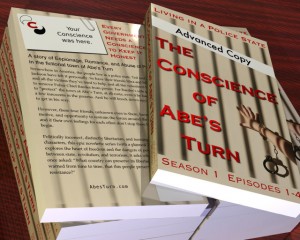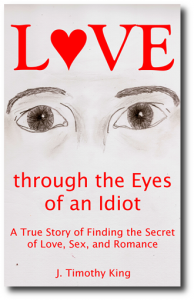
This appears to be turning into a blog-meme of sorts. No one has (to my knowledge) tagged anyone else, but the topic does seem to be inspiring a chain of posts.
Joanna Penn blogged back in April on 7 things she wish she knew before writing her first book. Then yesterday, Alexis Grant wrote about 4 things she wish she knew before writing her first book, ending her post with the question: Writers: what do you wish you knew before embarking on your first project? I saw these posts when Joanna tweeted them on Twitter, which inspired me to write this blog post you’re reading now. And that brings you up to date.
So now, while sipping the last of the coffee my pot will ever brew, between whiffs of acrid electrical smoke, I will talk about the 7 things I wish I knew before writing my first book.
-
Begin your book marketing before you’ve even decided what to write about. In other words, start marketing possible book topics to possible readers, before you even write your first word. My problem was that I got attached to an idea, and it became a labor of love. Still is! The characters in the Abe’s Turn universe are very real to me, and the issues that the story explores are ever-present and important. But what I didn’t bother to find out ahead of time was whether my target market—people who care about these issues with the same passion as I, and from the same perspective—would be interested in a fictional story. And now I’ve basically come to the conclusion that most of them see fiction as second-class, and it’s very hard to convince them of the value of fiction.
There another aspect of topic pre-marketing, which I also with I knew ahead of time: finding a book idea that sells itself to a core group of fans. You need a group of prospective readers who are so desperate for the book you’re writing that they’ll plop down actual, honest-to-goodness money for it, with almost no convincing.
-
You
can domust do your own promotion, but it’s harder than you think. Even if you go the traditional publishing route, you’ll need to do most of your own promotion. I actually knew this before I wrote my first book, but I didn’t realize how much work it was going to be, and how much effort it was going to take before making any headway at all. A lot of marketing experts, especially on the Internet, will lure you in with promises of instant wealth.But let me tell you the truth: you will work harder than probably you knew you could, and you’ll hit rock bottom, and all your friends and family will make you feel stupid and irresponsible and incompetent, because you’ve flagrantly committed yourself to such a risky outcome—like trying to make a living by playing the lottery—and you may even get mired down in these feelings (which will add months or years to the process), and as Luke from Gilmore Girls put it, you’ll just need to “jump in and be scared and stick with it until it gets fun.”
-
Regularly blog about the subject of your book before you begin writing it. A blog is one of the cheapest and most effective ways both to gain attention among your target market and to establish a relationship with potential readers. Yes, you can use ads (both online and off), and you can use press releases, and you can use publicity, and you can use direct mail… but none of these is as cheap or as easy or as measurable as using a blog.
It’s also important to blog regularly, religiously, with urgency and discipline, not just when the mood hits you. And to build your blog readership, both by blogging regularly and by funneling readers to your blog and to specific posts, using whatever means at your disposal.
-
Being a great writer won’t help you as an author. Plenty of successful authors are mediocre writers. Want proof? Go browse the top-selling books in just about any category. It is indeed true that 90% of everything is crap. And I mean 90% of everything. 90% of unpublished manuscripts are crap. 90% of self-published books are crap. 90% of indie-published books are crap. 90% of third-party published books are crap. And 90% of New York Times best sellers are also crap. As long as you’re a merely competent writer, you probably have the writing skills to make it.
So what’s the difference between a successful title and an unsuccessful one? It’s not the quality of the writing. I believe the difference can be described in one word: marketing. That is, knowing your readers, understanding their fears and worries and predilections and prejudices, establishing a relationship with them, and making them feel good about reading your books.
And of course, that leads to the corollary…
-
It’s more important to build and understand your fan-base than to make your book perfect. In other words, you don’t have to edit your book until it’s perfect. It much more important to be blogging every day, and writing and speaking publicly about your topic—and that’s only after you’ve done your preliminary marketing so that you know what your topic is. Your book can have huge gaffes in it (at least the first edition), as long as your fans are willing to overlook them. On the other hand, your book may be a flawless work of art, and your fans may still tear you apart over piddling little personal grievances that no one in their right mind would understand. (“You wrote in first-person rather than third, which is what you’ve always done before, and it’s always worked for you, but you changed. How stupid was that? Why did you write in first-person rather than third? Huh?! Explain that, you hack!”)
BTW, that example was inspired by real-life fan comments on Linda Howard’s novel To Die For, about which one fan said, “the whole 1st person thing traumatized me.” Oy!)
-
Begin designing and testing the front cover as soon as you know what you’re writing about, before you start writing the book. In other words, the front cover of the book comes first, before you’ve finished writing the book, not as an afterthought. Because the front cover of the book is the book’s primary marketing vehicle.
And the back cover is the book’s secondary marketing vehicle. And for a paperback, the first pages (just inside the cover) are the book’s tertiary marketing vehicle. That is, when you hand someone your book—at least when I hand someone a copy of one of my books—they start by looking at the front cover; and if that intrigues them, they turn it over and read the back cover; and if that continues to intrigue them, they flip open the front cover and start reading the inside-front page, and then the page after that.
So these parts of the book should be sketched out first, and mocked up, and shown to prospective readers so that you can get their reactions. And based on their reactions, you’ll want to adjust the concept and details of these pages. And you’ll also want to adjust the rest of the book, as you write it, in order to make sure it’s marketable.
I know that this is the reverse of what most publishers do, and even what most authors do. For example, with fiction and memoirs, a publisher wants to see that you’ve written the entire book first, then you can pitch the idea to them. So as an author, you must invest massive amounts of time in a manuscript, without knowing whether it will be marketable. And then, you need to market it to editors at the publishing house, who may or may not know what readers really want (but possibly know it better than you do), and so your book may or may not be easy or hard to sell to actual readers, if and when it finally does or does not come out in print. And this is why I decided to go the indie publishing route.
(However, I might imagine an author mocking up the cover and inside pages of a book, in order to establish that it is marketable, and then presenting that to a publisher along with the completed manuscript. I don’t know whether any author has actually tried that, though, or whether the publisher decided to scrap the market-tested material, or whether the book was ultimately a success or a failure.)
-
Being an author is an emotional process, and it can trigger depression. My book-authorship cycle goes something like this: excitement âž” enthusiasm âž” my blood dripping onto the page âž” exhaustion âž” first copies (optional, because it depends on publishing the book, but trés kewl) âž” hope âž” frustration âž” desperation âž” sad movies âž” depression âž” recovery âž” excitement (again) âž” etc. I still have faith, however, that I’ll be able to break the cycle by figuring out a way to circumvent the “frustration” phase, replacing it with “basking in the glory,” allowing me to shortcut directly back to “excitement.”
What’s fascinating to me is that most of these I actually did know. I knew them before I wrote my first book. But I had not internalized them. I’m still not sure I’ve internalized them, because I’m not yet a best-selling author. Yes, I did some of them right with my latest book, Love through the Eyes of an Idiot. So I guess I’m learning. But only in the wake of the recent economic situation have I found the diligence, discipline, and follow-through to start putting all these into practice, in a way I never thought necessary or possible before.
Someday, maybe I’ll write Book Marketing through the Eyes of an Idiot.
In any case, that’s my list of what I wish I knew before writing my first book.
If you’re a writer, what would you like to tell aspiring authors? What did you wish you knew before you wrote your first book?

Leave a Reply